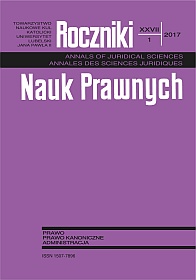A Gloss on Verdict IV CSK 598/12 Issued on 23rd November 2012 by the Polish Supreme Court
Abstract
The presented gloss refers to Verdict IV CSK 598/12 issued on 23rd November 2012 by the Supreme Court concerning the admissibility of recognizing the acquirer of the bankrupt’s business as his legal successor, and the impact of the extent of the heretofore provided contractual performances on the validity of the decision concerning the amount of the remuneration for the non-contractual use of a thing. The Supreme Court underlines that the disposal of an enterprise of a bankrupt company in the course of bankruptcy proceedings with a winding-up option, results in the events appropriate for a universal succession. The position indicating lack of effect of legal succession on the part of the acquirer refers to the case of acquisition of the bankrupt’s enterprise that remains its legal existence after the end of the bankruptcy proceedings. However, it shall not apply to the special situation connected with the disposal of the entire enterprise of the company in the finally completed bankruptcy proceedings. The Supreme Court found that in assessing the validity of the contested contractual provision, the extent of the contractual performances heretofore provided in the form of leasing fees, cannot be decisive. The disproportion in performances cannot be contrary to the principles of social coexistence. The present gloss accepts the arguments contained in the verdict of the Supreme Court, however, it also draws attention to the principle of proportionality between the creditors and the debtor, and the importance of Article 5 of the Civil Code.
References
Dolecki Henryk: Postępowanie cywilne. Zarys wykładu, wyd. 6, Warszawa: Wolters Kluwer 2015.
Grzybowski Stefan: Prawo cywilne. Zarys części ogólnej, wyd. 3, Warszawa: Państwowe Wydawnictwo Naukowe 1985.
Gurgul Stanisław: Prawo upadłościowe i naprawcze. Komentarz, wyd. 8, Warszawa: Wydawnictwo C.H. Beck 2011.
Kacprzak Agnieszka, Krzynówek Jerzy, Wołodkiewicz Witold: Regulae Iuris. Łacińskie inskrypcje na kolumnach Sądu Najwyższego Rzeczypospolitej Polskiej, red. W. Wołodkiewicz, wyd. 2, Warszawa: Wydawnictwo C.H. Beck 2006.
Kryszkiewicz Małgorzata: Przedsiębiorca nie ma co liczyć na taryfę ulgową, Gazeta Prawna nr 46 (3687) 2014, http://prawo.gazetaprawna.pl/artykuly/782496, przedsiebiorca-nie-ma-co-liczyc-na-taryfe-ulgowa-przed-sadem.html [dostęp: 7.03.2014].
Piasecki Kazimierz: Komentarz do art. 5, [w:] Kodeks cywilny z komentarzem, red. J. Winiarz, Warszawa: Wydawnictwo Prawnicze 1980, s. 18-22.
Radwański Zbigniew: Prawo cywilne – część ogólna, wyd. 10, Warszawa: Wydawnictwo C.H. Beck 2009.
Romanowski Michał: Zobowiązania rezultatu i starannego działania, Przegląd Prawa Handlowego 2 (1997), s. 23-26.
Ziembiński Zygmunt: Logika praktyczna, wyd. 16, Warszawa: Wydawnictwo Naukowe PWN 1993.
Ziemianin Bronisław, Dadańska Katarzyna A.: Prawo rzeczowe, wyd. 3, Warszawa Wolters Kluwer Polska 2012.
Ziemianin Bronisław, Kuniewicz Zbigniew: Prawo cywilne. Część ogólna, Poznań: „Ars boni et aequi” Przedsiębiorstwo Wydawnicze – Michał Rozwadowski 2007.
Zimmerman Piotr: Prawo upadłościowe i naprawcze. Komentarz, wyd. 2, Warszawa: Wydawnictwo C.H. Beck 2012.
Copyright (c) 2017 Roczniki Nauk Prawnych

This work is licensed under a Creative Commons Attribution-NonCommercial-NoDerivatives 4.0 International License.


